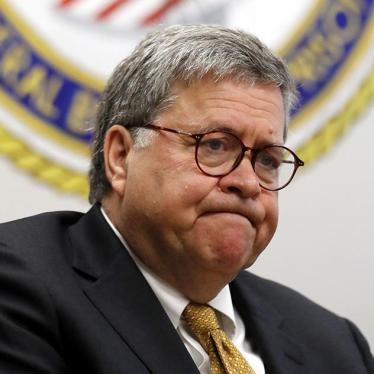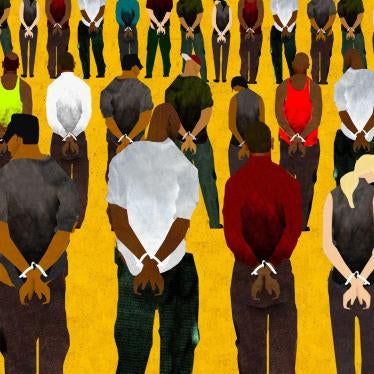Below is the prepared testimony of Laura Pitter, interim deputy director of the US Program at Human Rights Watch, for the New York State Senate Standing Committee on Codes for a September 9, 2019 public hearing on the “Implementation of Discovery Reform (S1509 – Part LLL).”
My name is Laura Pitter. I am the interim deputy director of the US Program for Human Rights Watch. Human Rights Watch is a non-profit, independent organization that investigates allegations of human rights violations in more than 90 countries around the world, including the United States. We document human rights violations, issue detailed reports, and advocate for changes in law, policy, and practice to address the harms.
The right to a fair trial when accused of a crime and exposed to punishment including imprisonment is a fundamental human right that US federal and state governments are required to respect and ensure. This includes the right to the presumption of innocence, to be informed promptly and in detail of the nature and cause of the charges against you, the right not be forced to testify against oneself or confess guilt, and the right to adequate time and facilities to prepare a defense.
New York’s current-but-soon-to-be-replaced discovery law does not protect these rights and creates prejudice against people accused of crimes, whether they are guilty or innocent. It prevents people from having sufficient information about the evidence against them to challenge its veracity or interpretation or prepare an effective defense. Prosecutors can withhold evidence until the eve of trial, making it difficult if not impossible for the defense to determine whether witnesses have bias, mistook what they observed, or gave only part of the story to the police. As a result, defendants are likely to plead guilty at early stages fearing what is unknown about the evidence and facing harsher post-trial sentences should they refuse plea offers.[1]
Fortunately, the New York State legislature passed historic criminal justice reforms during the last legislative session, including important discovery reform measures.[2] These new laws require orderly and reasonable discovery disclosures by both prosecution and defense. Prosecutors must disclose police reports, witness statements, witness contact information, tangible evidence like photographs and video, witness criminal histories and any exculpatory or mitigating evidence within a set timeframe, absent court permission for a delay or exceptions as appropriate.[3] The defense must comply subsequently with their obligations, subject to Constitutional limitations. Disclosures give each side the opportunity to conduct investigations and to intelligently assess the strengths and weaknesses of their cases, in order to make appropriate decisions on how to proceed.[4]
Some resistant to this new law have raised concerns that it will endanger witnesses and crime victims.[5] That fear is unfounded. Many cases do not involve an identifiable victim or witnesses who are not law enforcement.[6] For those instances when there is an identifiable risk of harm to or intimidation of a witness, the new law provides strong mechanisms, including redactions, protective orders, and exceptions to discovery, that will serve as protection.[7] A recent study of other states found “little evidence that open-file discovery endangers the safety of witnesses….”[8] No state that has reformed its discovery rules has ever omitted the rules requiring district attorneys to disclose witnesses’ names and contact information.[9] More than 40 states use the same rule.[10] New Jersey has used it since 1973, Florida since 1968, North Carolina since 2004, and Texas since 2014.[11]
With passage of this new law New York moved from having one of the most restrictive, harmful discovery laws in the nation to having one of the most open, fair, and safe ones. Key now will be ensuring proper implementation. As other states consider improving their discovery rules New York has an opportunity to be a model for reform. Police, prosecutors, and defendants will have to share more kinds of information more quickly than ever before. We welcome the Committee’s interest in ensuring that all parties carry out due diligence and are compliant once the law takes effect.
Thank you for the opportunity to present testimony to your committee and consideration of our comments. If you have any questions, please contact Thomas Rachko in my office at rachkot@hrw.org or (202) 612 - 4328.
Sincerely,
Laura Pitter
[1] Letter from Human Rights Watch to New York State Assembly and Senate, “Letter of Support for New York's Discovery for Justice Reform Act, S. 1716/A.1431,” March 22, 2019, https://www.hrw.org/news/2019/03/26/human-rights-watch-letter-support-new-yorks-discovery-justice-reform-act-s-1716.
[2] New York State Senate bill, S1509 – Part LLL, Article 245, https://nyassembly.gov/leg/?default_fld=&leg_video=&bn=A02009&term=2019&Summary=Y&Actions=Y&Text=Y&mc_cid=e8365770d5&mc_eid=8eeb3af3f3 (accessed September 5, 2019).
[3] Center for Court Innovation, “Discovery Reform in New York: Major Legislative Provisions,”
May 2019, https://www.courtinnovation.org/sites/default/files/media/document/2019/Discovery-NYS_Full.pdf (accessed September 5, 2019).
[4] Ibid.
[5] Manhattan District Attorney’s Office, “Written Testimony by Manhattan District Attorney Cyrus R. Vance Jr. for City Council Committee on the Justice System Oversight Hearing on ‘Preparing for the Implementation of Bail, Speedy Trial, and Discovery Reform,’” May 22, 2019, https://www.manhattanda.org/testimony-for-city-council-committee-on-the-justice-system-oversight-hearing-on-preparing-for-the-implementation-of-bail-speedy-trial-and-discovery-reform/ (accessed September 5, 2019)
[6] Repeal the Blindfold Coalition, “The Discovery for Justice Reform Act Protects Witnesses,” February 2019, https://indefenseof.us/assets/images/Memo-on-Discovery-Reform-Witness-Safety-Feb-2019.pdf (accessed September 5, 2019)
[7] New York Criminal Procedure Laws, New Law, Section 245.70, See Section, “Protective orders,” https://www.nysenate.gov/legislation/laws/CPL/245.70 (accessed September 5, 2019); See also, Discovery Reform in New York, May 2019, https://www.courtinnovation.org/sites/default/files/media/document/2019/Discovery-NYS_Full.pdf, p. 6.
[8] Jenia Turner and Allison Redlich, “Two Models of Pre-Plea Discovery in Criminal Cases: An Empirical Comparison,” Washington and Lee Law Review 73 (2016), https://papers.ssrn.com/sol3/papers.cfm?abstract_id=2747161 (accessed September 5, 2019).
[9] Tina Luongo, “Discovery Reform is Tried and Tested,” New York Daily News, Letter to the Editor, June 5, 2019, https://www.nydailynews.com/opinion/ny-letter-june-5-20190605-vnf7u6fpwjfxfitdlv6vhkaieq-story.html (accessed September 5, 2019).
[10] Ibid. See also, “List of States with Open Discovery Rules,” Discovery for Justice, https://docs.wixstatic.com/ugd/30f160_1c5feb62012d4755a75d3677492c3dbd.pdf (accessed Sept. 6, 2019).
[11] Ibid.







